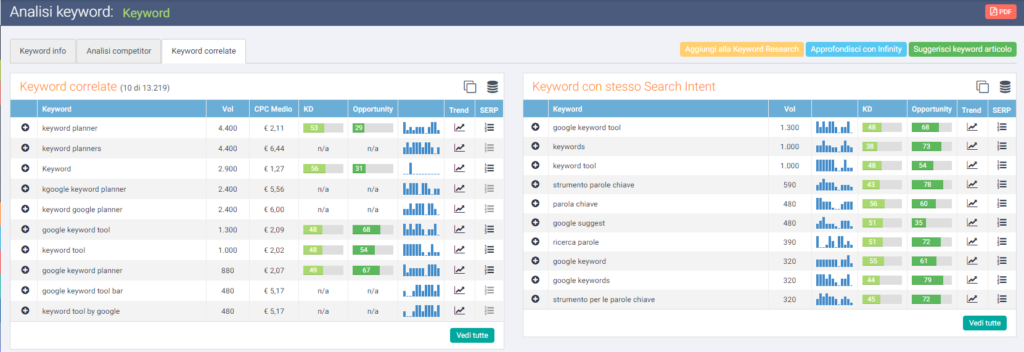Minor Keywords: how to optimize a text with search intent and correlated ones
Let’s get back to talk about keyword research, focusing this time on a more specific topic: if we have already defined what a keyword is and how to choose main keywords to include in an article, we are going to try now and give a practical inspiration to find the so-called minor keywords, obviously using SEOZoom’s tools to help us with the work!
What are minor keywords
Terminology already clarifies the first aspect: minor keywords naturally descend from the main keyword we have previously assigned our article, the one derived from the strategic keyword research we have operated in the early stages of the work. Inside SEOZoom, as we know, there are various features that can speed up the operation, but we could also start with a random keyword to discover the potential value of its minor ones.
Keyword analysis with SEOZoom
For instance, typing the term keyword in the search box we will find every single info correlated to the word: keyword difficulty, keyword opportunity, average research volume, total amount of indexed pages, average CPC and seasonality. Moreover, SEOZoom shows us the latest SERP, the performances of the sites in Google’s search result page, the backlink competition, search interests according to Google Trends and the potential of ADS in SERP with correlated trend.
Discover minor keywords with SEOZoom’s tools
Starting from this screen we can go discover the correlated keywords tab, that displays an extensive analysis of all those keywords semantically or conceptually tied to the one we chose as main. It is all about, as already described in a previous insight, basically lists of correlated keywords and keywords with similar search intent, that allows us to widen the extent and depth of the content we are working on.
With minor keywords you can optimize contents
It is among these that we can find our minor keywords, useful to the optimization of the content by adding context to a page and sending extra signals to search engines to understand our page and, finally, determine its ranking in SERP.
As we were saying about Google’s ranking factors, infact, part of the SEO community lists among signals also the use of LSI keywords in the content, a.k.a terms semantically tied to main keywords: not only synonyms e small grammar variations (a word used in plural or singular form, for example), but also and over everything else a natural and contextualized use of words that can add relevance and accuracy to the page’s topic, such as the ones elaborated by SEOZoom with the search intent research.
Examples of minor keywords: correlated and with similar search intent
All it takes is a practical try out to understand this tool’s potential: studying the term keyword, we can see that suggestions on correlated keywords concern some specifications on the main keyword. In other words, semantically related results and often long tail keys that narrow down the research contest and offer a new and more suitable content compared to the query, that is anyway still present: maybe a word is added (keyword planner) or a couple (google keyword tool bar), but still remaining inside the same semantic area.
The search intent based algorithm instead goes a bit further, because it interprets the user’s query and tries to find out which results really are relevant with what he is looking for. In practical terms, again, and for instance Google would be able to understand that whoever is typing “keyword” could be searching for info on the same in term in another language based on geolocalization, or he could have been specifically looking for “google suggest” or “keyword tool“, starting from the same term. More specific the query is (on the search intent point of view, as well), more specific Google’s answers and SEOZoom’s optimization suggestions will be too.
Unleashing minor keywords’ potential
This consideration gives us the chance to understand a pretty frequent situation, like those pages that succeed in ranking for keywords not event actually present inside the text: generally these are minor keywords that Google deduced from the content’s interpretation and users’ search intent analysis, and that represent a potential fortune to farm and cultivate. If they effectively are useful to the site and related to the page’s content, we could try to operate an on-page optimization (focusing on, let’s say, headings or developing new insight paragraphs) to reinforce Google’s perception, that could be rewarded with a better ranking for that specific keyword.
Furthermore, this tells us that working on contents does not truly stop by clicking on the “Publish” button: it always is important to monitor our performances on SERP pages, to try and analyze the actual reasons behind the approval gained on Google (or the bad attention, for that matter), to go and look for solutions on how to improve your articles by studying your competitors’ ranking too and so on. In a nutshell, optimization is a long-lasting process that can really determine a project’s success!





